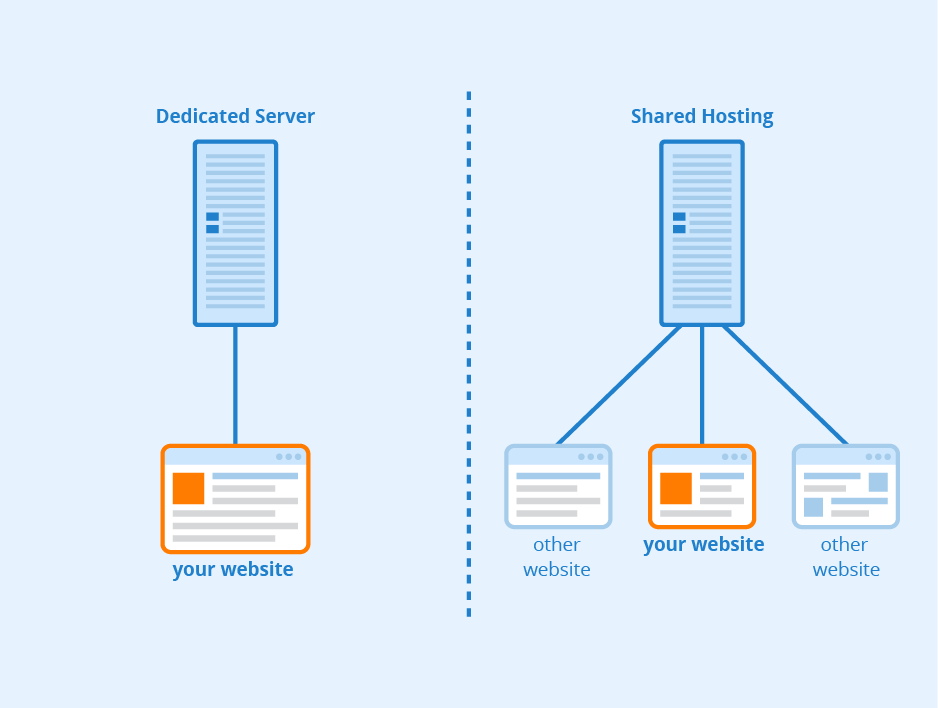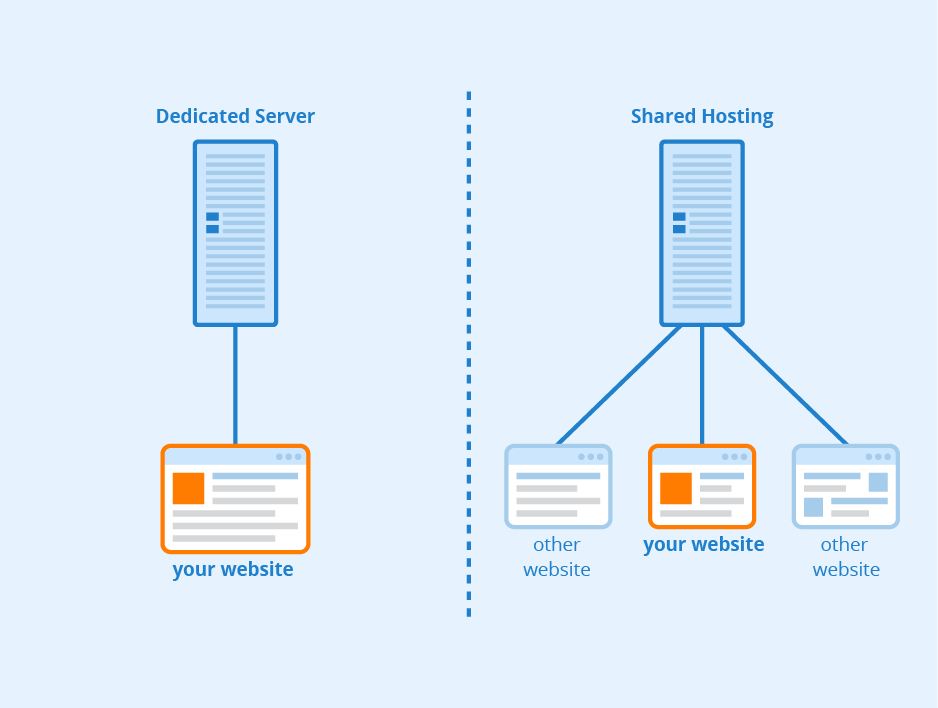When it comes to hosting your website, security is always a top concern. Many people opt for shared hosting due to its affordability and convenience, but is shared hosting really secure? Let’s delve into the world of shared hosting to understand its security implications.
Shared hosting involves multiple websites sharing resources on a single server. While this can be cost-effective, it also means that potential security risks are shared among all the websites on the server. This raises concerns about the overall security of your website. However, hosting providers take numerous measures to ensure the security of shared hosting environments.
Shared hosting can be secure when proper security measures are in place. Hosting providers implement various security measures such as firewalls, regular security updates, and malware scanning to protect the shared hosting environment. However, the level of security can vary depending on the provider. It’s essential to choose a reputable hosting provider that prioritizes security and offers additional security features like SSL certificates. Additionally, website owners should also take measures to secure their own websites, such as keeping software up to date and using strong passwords.

Understanding Shared Hosting Security
When it comes to web hosting, shared hosting is one of the most popular options for individuals and small businesses. Shared hosting allows multiple websites to share the same server resources, making it an affordable and convenient choice. However, a common concern among website owners is the security of shared hosting. Is it secure enough to protect sensitive data and prevent cyber attacks? In this article, we will explore the security aspects of shared hosting and whether it is a safe option for your website.
Shared hosting providers are responsible for maintaining the security of the server infrastructure and implementing measures to protect against common threats. They typically have advanced security systems in place, such as firewalls, intrusion detection systems, and regular software updates. Additionally, shared hosting servers are often monitored 24/7 by a team of security experts who can quickly respond to any security incidents. These security measures help prevent unauthorized access to your website and protect it from common cyber threats.
However, it’s important to understand that shared hosting is not immune to security risks. Since multiple websites share the same server, an attack on one website could potentially affect others. For example, if a website hosted on the same server as yours is compromised, there is a small possibility that the attacker could gain access to your website through vulnerabilities in the server’s configuration. While the chances are low, it’s crucial to take additional precautions to ensure your website’s security.
Protecting Your Website on a Shared Hosting Environment
To further enhance the security of your website on a shared hosting environment, there are several steps you can take:
- Choose a reputable hosting provider: Before signing up for shared hosting, research different providers and choose one with a good reputation for security. Look for providers that offer advanced security features and have a strong track record of protecting websites.
- Keep your website up to date: Regularly update your website’s software, plugins, and themes to ensure they are free from vulnerabilities. Hackers often exploit outdated software to gain unauthorized access to websites.
- Use strong and unique passwords: Create strong passwords for your website’s admin accounts and avoid using the same password for multiple accounts. Consider using a password manager to securely store and generate complex passwords.
- Implement additional security measures: Consider adding an extra layer of security to your website, such as a web application firewall (WAF) or a security plugin. These tools can help detect and block malicious traffic before it reaches your website.
By following these best practices, you can significantly reduce the risk of security breaches and ensure the safety of your website.
Pros and Cons of Shared Hosting Security
Now, let’s discuss the pros and cons of shared hosting security:
Pros
1. Cost-effective: Shared hosting is a cost-effective option since the server resources are shared among multiple websites. It’s an affordable choice for individuals and small businesses with limited budgets.
2. Easy setup and management: Shared hosting is user-friendly, making it easy for beginners to set up and manage their websites. The hosting provider takes care of server maintenance and updates, allowing you to focus on building and maintaining your website.
3. Technical support: Most shared hosting providers offer 24/7 technical support to assist users with any issues or concerns. This ensures that help is readily available whenever you need it.
Cons
1. Limited resources: Since server resources are shared among multiple websites, you may experience reduced performance during peak traffic periods. If one website on the server receives a significant amount of traffic, it can impact the performance of other websites.
2. Security vulnerabilities: While shared hosting providers implement security measures, there is still a small risk of security vulnerabilities. Attackers targeting one website on the server may be able to exploit weaknesses and gain unauthorized access to other websites.
3. Customization limitations: Shared hosting has limitations when it comes to customization and server configurations. You may have restricted access to certain server settings, which can be an issue if you require specific configurations for your website.
Overall, shared hosting provides a balance between affordability and convenience. While there are some security considerations, following best practices and choosing a reputable hosting provider can mitigate the risks.
Conclusion
Shared hosting can be a secure option for hosting your website, as long as you take the necessary precautions and choose a reputable hosting provider. While there are potential security risks associated with sharing server resources, following best practices such as keeping your website up to date and implementing additional security measures can significantly reduce the risk of security breaches.
Remember to choose a reputable hosting provider that prioritizes security and offers advanced security features. Regularly update your website’s software and use strong and unique passwords to protect your website from potential threats. By following these measures, you can enjoy the benefits of shared hosting while maintaining the security of your website.
Key Takeaways: Is Shared Hosting Secure?
- Shared hosting can be secure if proper security measures are in place.
- It is important to choose a reliable hosting provider that prioritizes security.
- Regular software updates and patches are crucial to keeping shared hosting secure.
- Implementing strong passwords and using secure protocols can enhance the security of shared hosting.
- Regular backups are essential to mitigate the risk of data loss in shared hosting environments.
Shared hosting can provide a convenient and affordable way to host a website.
However, it also comes with certain security risks that you need to be aware of.
Since multiple websites are hosted on the same server, there is a possibility of cross-site contamination.
If a neighboring website on the same server is compromised, it can potentially affect the security of your website.
Additionally, shared hosting may have limitations on security measures you can implement.
However, reputable hosting providers take steps to mitigate these risks by implementing strong security measures.
They regularly update server software, monitor for unusual activity, and provide security measures like firewalls and malware scanning.
Ultimately, while shared hosting can be secure, it is important to choose a reliable hosting provider and take additional security precautions like regularly updating your website software and using strong passwords.
By being mindful of the potential risks and taking appropriate actions, you can have a secure hosting experience with shared hosting.

